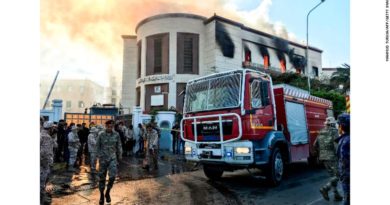Sri Lanka bomb attacks were revenge for New Zealand mosque killings
Devastating Easter bombings in Sri Lanka were retaliation for the recent deadly attacks on mosques in New Zealand, a Sri Lankan official said on Tuesday, adding that two domestic Islamist groups were believed to have been behind Sunday’s blasts.
ISIS has claimed responsibility for the coordinated attacks, which officials said were carried out by at least seven suicide bombers, on three churches and four hotels. The toll rose to 321 dead with about 500 people wounded.
The initial investigation has revealed that this was in retaliation for the New Zealand mosque attack, junior minister for defence Ruwan Wijewardene told parliament.
He did not elaborate on why authorities believed there was a link to the killing of 50 people at two mosques in the New Zealand city of Christchurch during Friday prayers on March 15. A lone gunman carried out those attacks.
Wijewardene said two Sri Lankan Islamist groups – the National Thawheed Jama’ut and Jammiyathul Millathu Ibrahim – were responsible for the blasts early on Sunday during Easter services and as high-end hotels served breakfast.
U.S. intelligence sources said the attacks carried some of the hallmarks of the Islamic State militant group, although they were cautious because it had not claimed responsibility.
Islamic State is usually quick to claim responsibility for, or links to, attacks against foreign targets or religious groups, whether it was involved or not, they said.
Prime Minister Ranil Wickremesinghe told parliament investigators were looking into foreign links.
Earlier on Tuesday, Sri Lankan government and military sources said a Syrian had been detained among 40 people being questioned over the bombs.
He was arrested after the interrogation of local suspects, one of the sources said, referring to the unidentified Syrian.
FUNERALS
Tuesday was declared a national day of mourning and the funerals of some of the victims were held, as pressure mounted on the government over why effective action had not been taken in response to a warning this month about a possible attack on churches by the little-known National Thawheed Jama’ut group.
The first six attacks – on three churches and three luxury hotels – came within 20 minutes on Sunday morning.
Two more explosions – at a downmarket hotel and a house in a suburb of the capital, Colombo – came in the early afternoon.
Most of the dead and wounded were Sri Lankans, although government officials said 38 foreigners were killed. That included British, U.S., Australian, Turkish, Indian, Chinese, Danish, Dutch and Portuguese nationals.
The U.N. Children’s Fund said 45 children were among the dead.
Footage on CNN showed what it said was one of the bombers wearing a heavy backpack. The man patted a child on the head before entering the Gothic-style St. Sebastian church in Katuwapitiya, north of Colombo. Dozens were killed there.
The bombs brought a shattering end to a relative calm that had existed in the Buddhist-majority Indian Ocean island since a bitter civil war against mostly Hindu, ethnic Tamil separatists ended 10 years ago, and raised fears of a return to sectarian violence.
Sri Lanka’s 22 million people include minority Christians, Muslims and Hindus. Until now, Christians had largely managed to avoid the worst of the island’s conflict and communal tensions.
The government imposed emergency rule at midnight on Monday, giving police extensive powers to detain and interrogate suspects without court orders.
An overnight curfew has also been imposed since Sunday.
Also Read:
NASA’s accelerated moon plans create uncertainty for international partners
FBI TO HELP
U.S. President Donald Trump called Prime Minister Wickremesinghe on Monday to pledge U.S. support in bringing the perpetrators to justice.
The Washington Post quoted an unidentified law enforcement official as saying Federal Bureau of Investigation (FBI) agents were being sent to Sri Lanka to help with the investigation.
The FBI had offered expertise to test evidence and analysts were scouring databases for information, the Post said. Counter-terrorism officials from Britain were also due on Tuesday, a Western diplomat in Colombo said.
The attacks have also underlined concern over fractures in Sri Lanka’s government, and whether the discord prevented action that might have stopped them.
The government received a tip-off from India this month about a possible attack on churches by the National Thawheed Jama’ut.
It was not immediately clear what action, if any, was taken in response. A government minister said on Monday that Wickremesinghe had not been informed about the warning and had been shut out of top security meetings because of a feud with President Maithripala Sirisena.
Sirisena fired Wickremesinghe last year only to be forced to reinstate him under pressure from the Supreme Court. Their relationship is reported to be fraught.
The U.S. State Department said in a travel advisory terrorist groups were possibly plotting more attacks in Sri Lanka.
China’s embassy warned its nationals against travelling to Sri Lanka in the near term because of huge security risks.
China is a major investor in Sri Lanka. The embassy said one Chinese national was killed, five wounded and five were missing.
Also Read:
Who’s in Lil Dicky’s ‘Earth’ song? Every celebrity from Ariana Grande to Justin Bieber
France To Launch International Contest To Rebuild Notre Dame Spire






